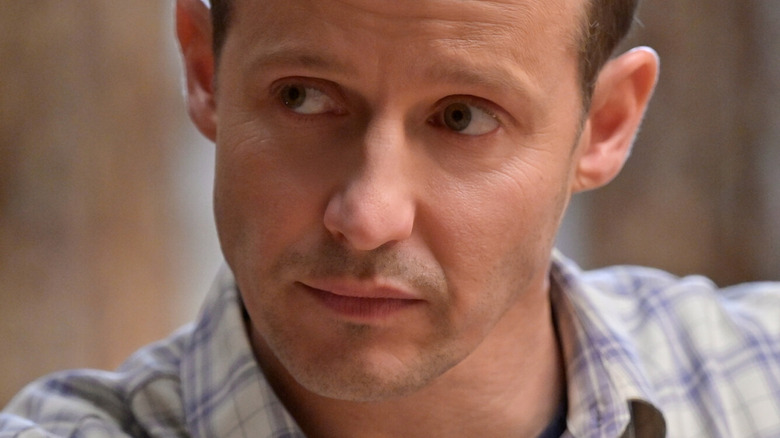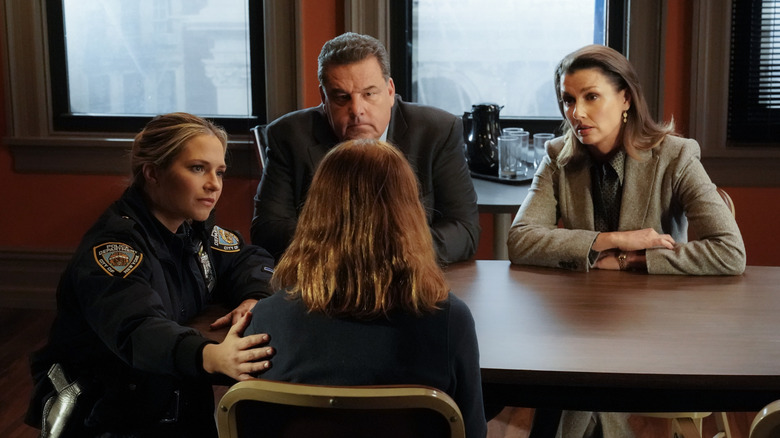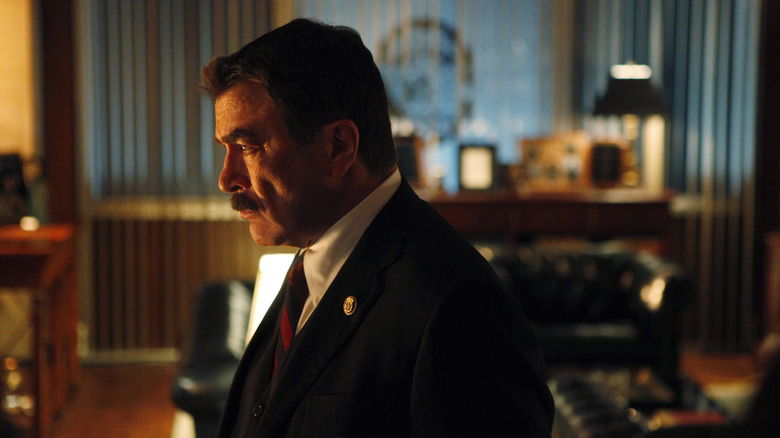Why Blue Bloods Won't Be Featuring Police Mistrust Storylines Anytime Soon
The truth is that CBS' "Blue Bloods" exists at a time that could prove dangerous for a series following a family of cops. While police procedurals following the crime-of-the-week format have always been a winning formula, with the events of the last decade coming to a head in 2020, the mood toward police had the possibility of killing any desire audiences had to see police on the screen depicted as heroes.
Still, "Blue Bloods" didn't shy away from the subject when Season 11 premiered in December 2020. While there were plenty of storylines running through the season, there were others that stood out. In Episode 4, "True Blue," writers showed they weren't afraid to address the subject as Jamie Reagan (Will Estes) joined forces with his sister Erin (Bridget Moynahan) and Anthony Abetemarco (Steve Schirripa) to investigate an underground bar. Even though the bar seems like a place of solace for the New York Police Department and the New York Fire Department, it is a safe haven for both departments' criminal endeavors. That wasn't the only storyline dealing with police officers misbehaving. In this episode, Reagan patriarch Frank (Tom Selleck) looks into a case of police brutality committed by Abigail Baker's (Abigail Hawk) husband.
Now that we are two years beyond the events of 2020 and two seasons further on the popular police series, showrunner Kevin Wade revealed that fans won't be seeing many more storylines dealing involving the mistrust of the police. Here is what he had to say on the matter.
No one tunes in for a lecture
At its heart, "Blue Bloods" is about a family of cops, which means that most of the characters' perspectives would support the police across the country. However, the writers have been able to inject some alternative perspectives by making Nikki (Sami Gayle), Erin's daughter, ask questions that poke at the inconsistencies of the "old-guard" view. Erin Reagan, as a DA, also holds the family of law enforcement faithful accountable for any views that ignore common sense for the purpose of bleeding blue. However, Kevin Wade sat down with TV Line and talked about why they wouldn't add many more storylines dealing with the mistrust of police.
Even though the Season 13 premiere, "Keeping the Faith," takes a hard look at the image of the police and the Catholic Church and the increasing criticism and mistrust of both institutions, Wade believes it will be much rarer. "Nobody is tuning in on Friday night at 10 o'clock to be taught a lesson or lectured on what the right point of view is." Wade said. "So when we try to address issues that have two very vocal sides to them, we try to build a soap box of equal dimensions for the, let's call it, 'antagonistic' point of view."
"Blue Bloods" has spent 13 seasons bringing dozens of storylines every year that pit two different viewpoints against each other, giving a voice to everyone in every episode. But the series isn't new to delving into the complex questions surrounding the darker side of law enforcement. A storyline from way back in Season 1 showed us from the very beginning that they would be fearless in their storytelling.
Blue Templar proved they weren't afraid of the narrative
At the beginning of the series, one of the aspects that gave depth and emotion to the pilot was the discovery that there had once been a fourth Reagan child. Joe Reagan was a police officer who died in the line of duty, something that weighs heavily on the shoulders of his father, Frank, grandfather Henry (Len Cariou), and his three surviving siblings. Throughout the first season, one of the primary storylines that underlined the episodic themes was the fact that Joe's death was anything but the ordinary officer killed in the line of duty.
The Blue Templar serves as a fraternity of police officers that initially worked to root out the corrupt cops from the department. Once the original members left, the remaining and new members of the fraternity became corrupt themselves. Once their enterprises developed into murdering witnesses of drug busts so they could keep the drug money and disperse it among each other, the Templars caught the attention of Joe Reagan. This, in turn, resulted in his death. The fraternity even attempted to take out Jamie before they were brought down in a triumphant moment of Frank facing the men who murdered his son.
While the Blue Templar members were secondary villains that were not much more than an underlying storyline to push the season forward, it showed that the showrunners weren't afraid to tackle the subject of corrupt police officers. The events of 2020 could have killed any TV series that focuses on cops being the white-hat heroes, but "Blue Bloods" had already established themselves as confident and transparent representatives of the narrative. They found a middle ground that continues to prove much harder to find in the real world.


